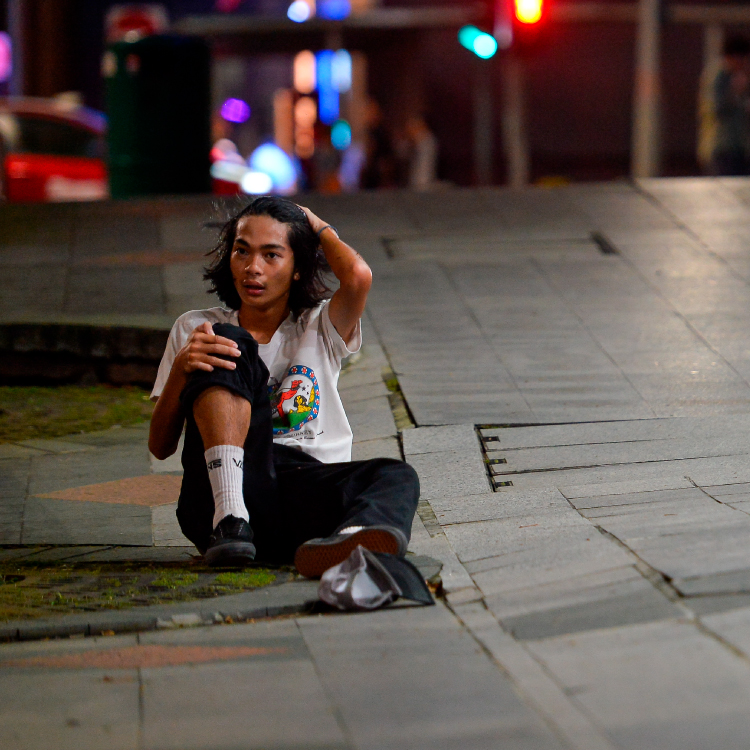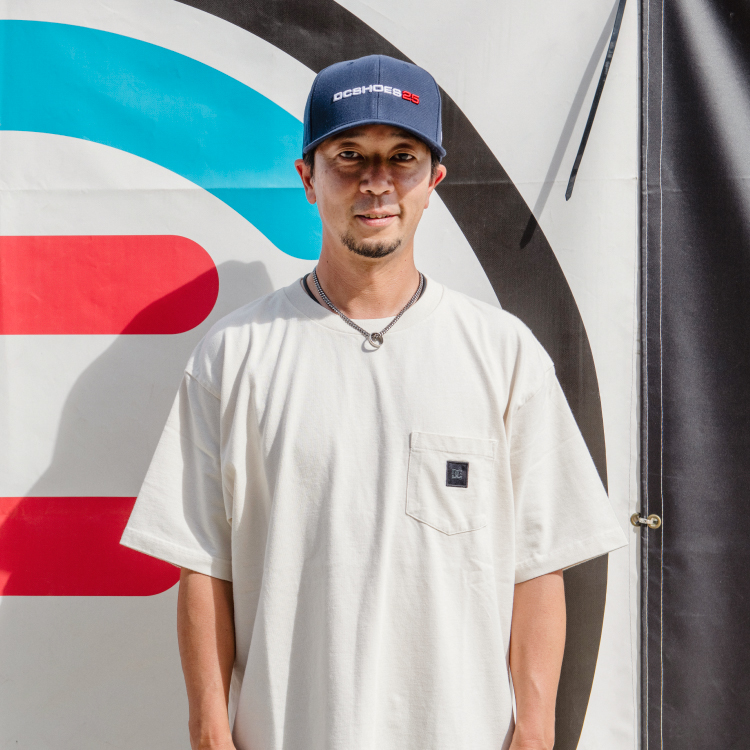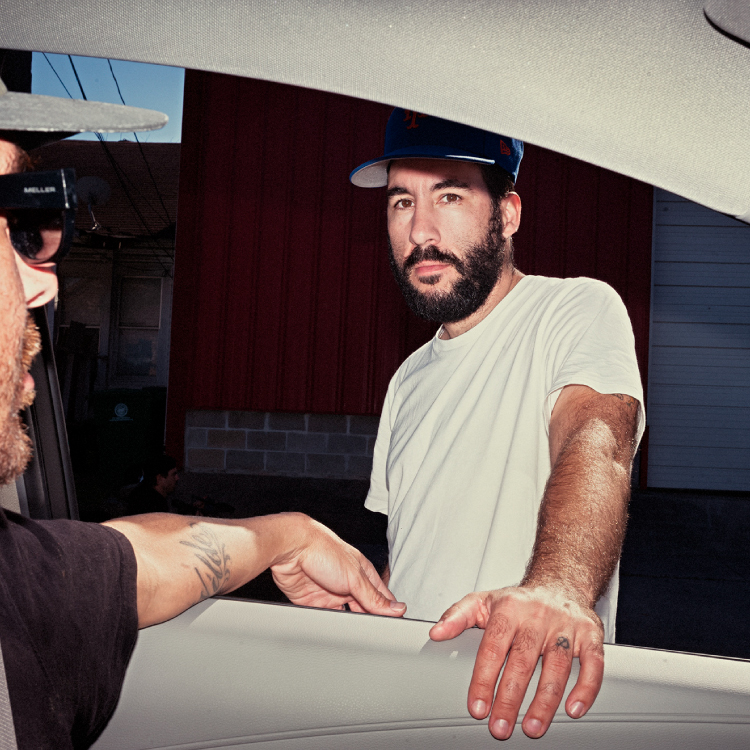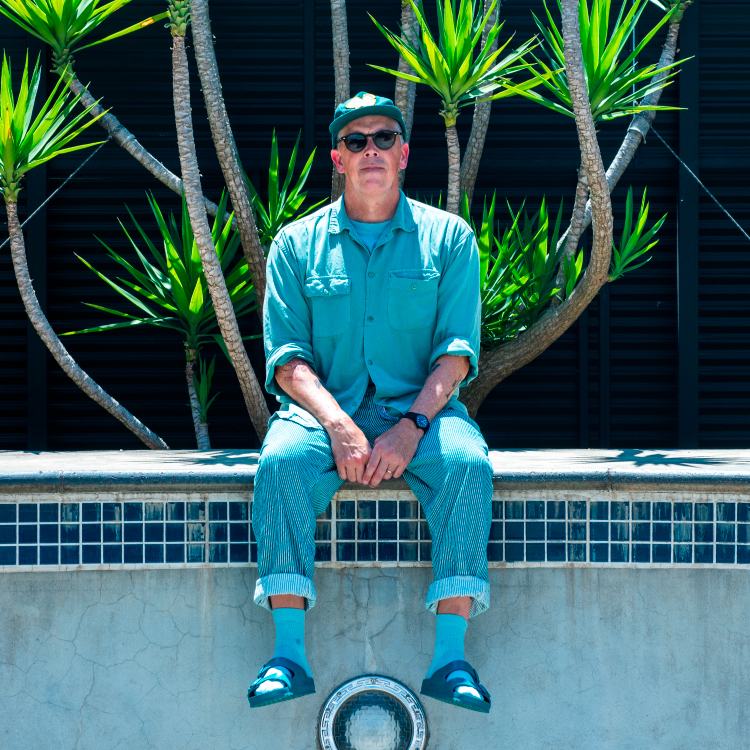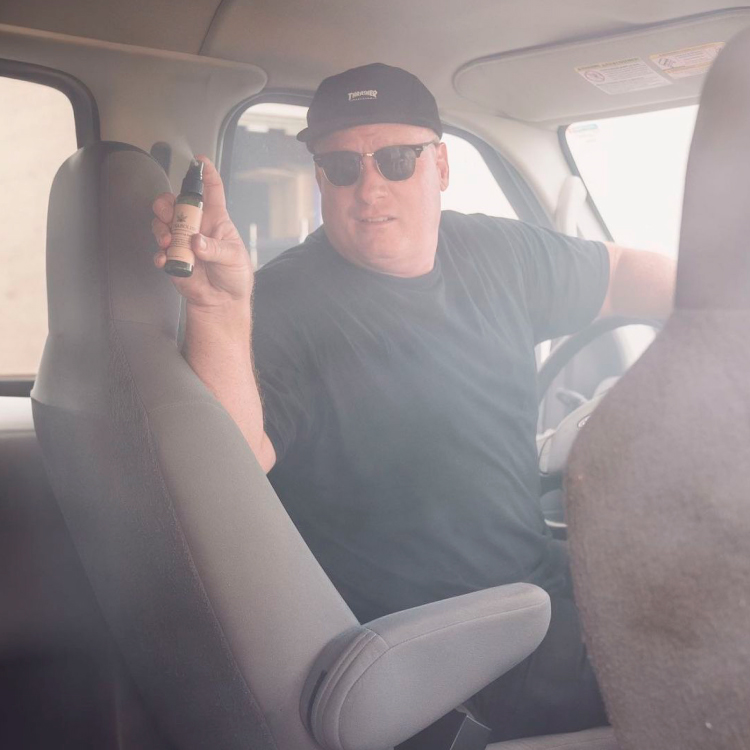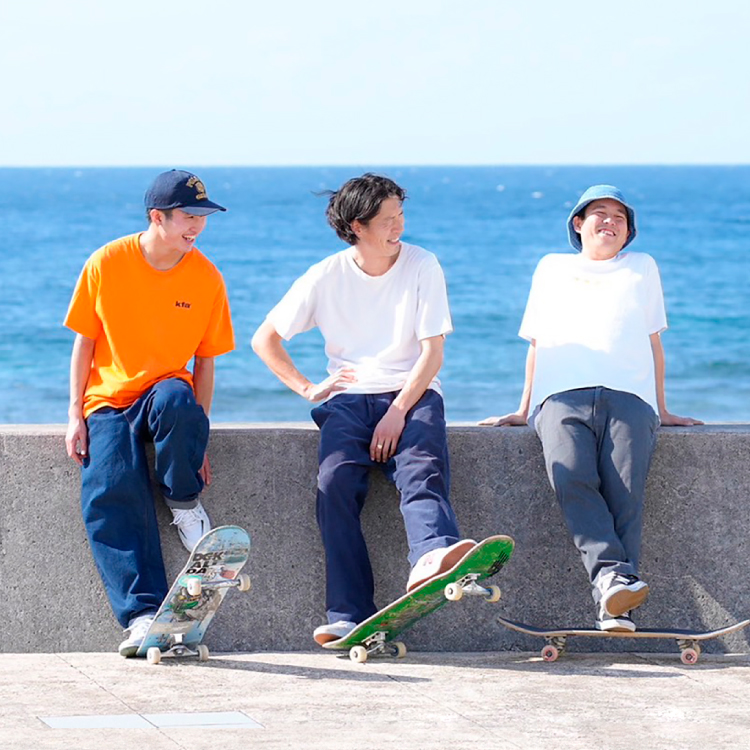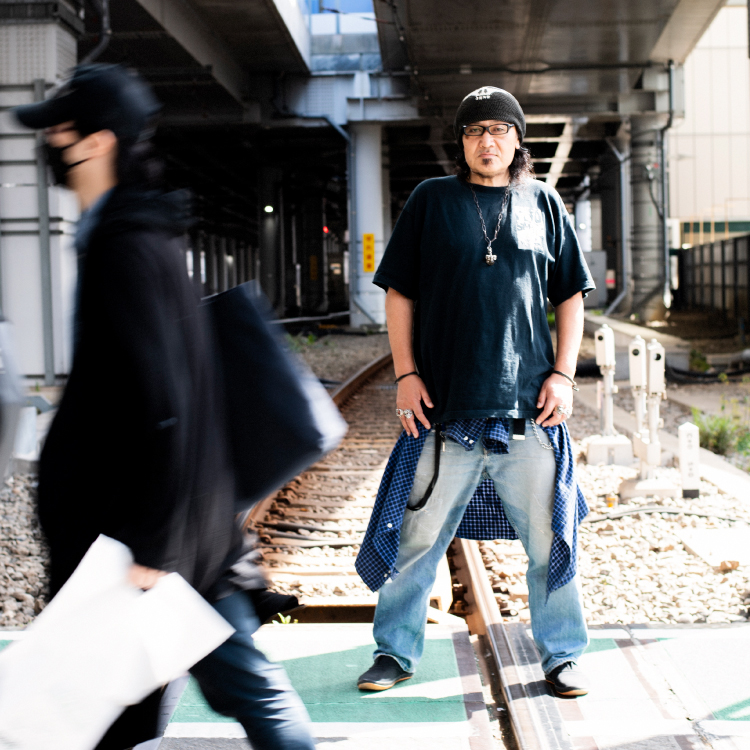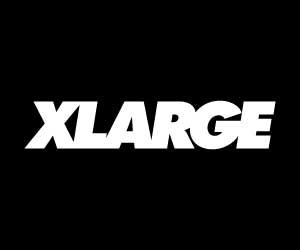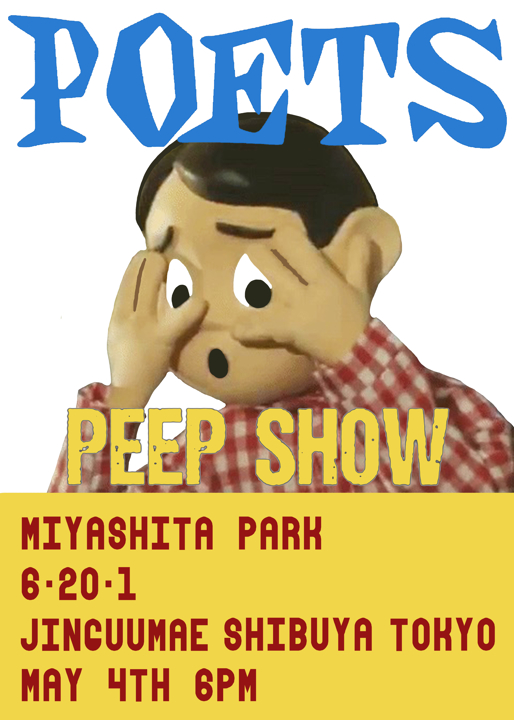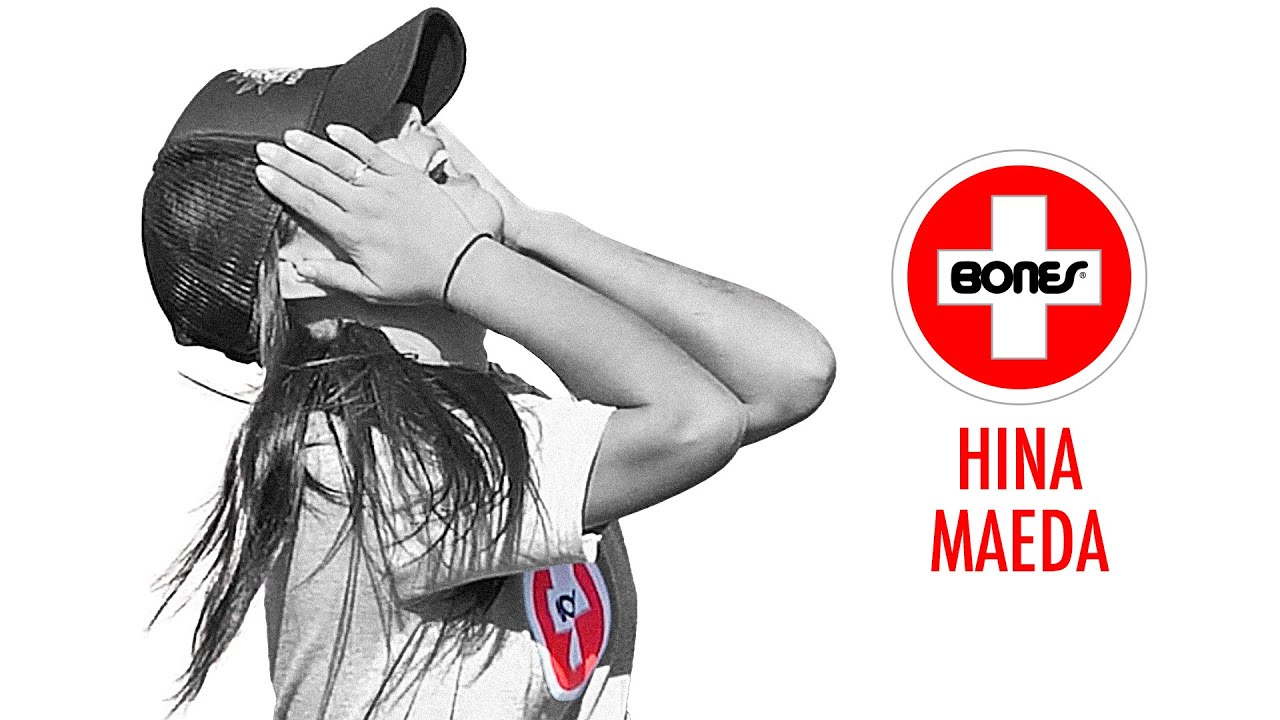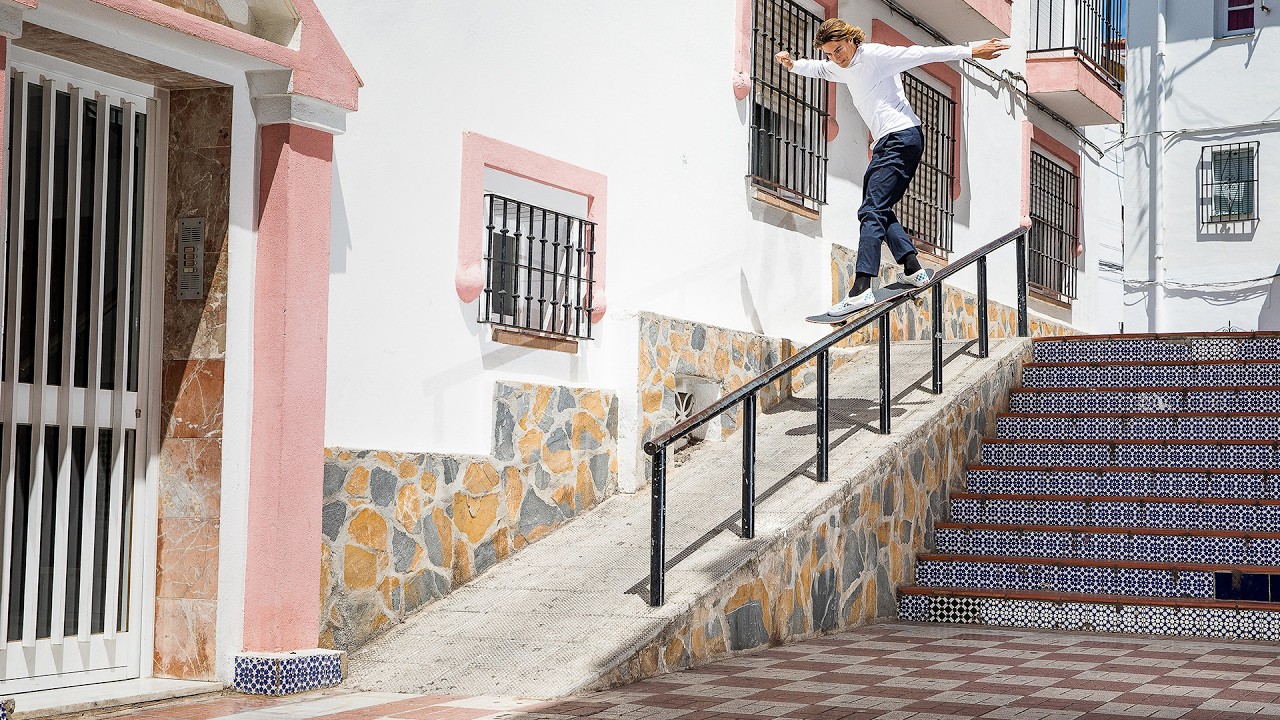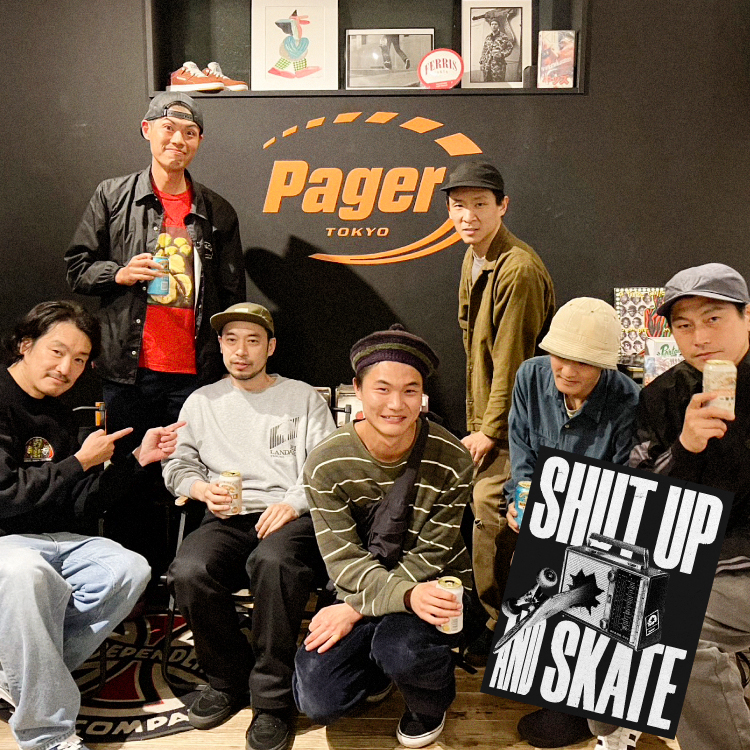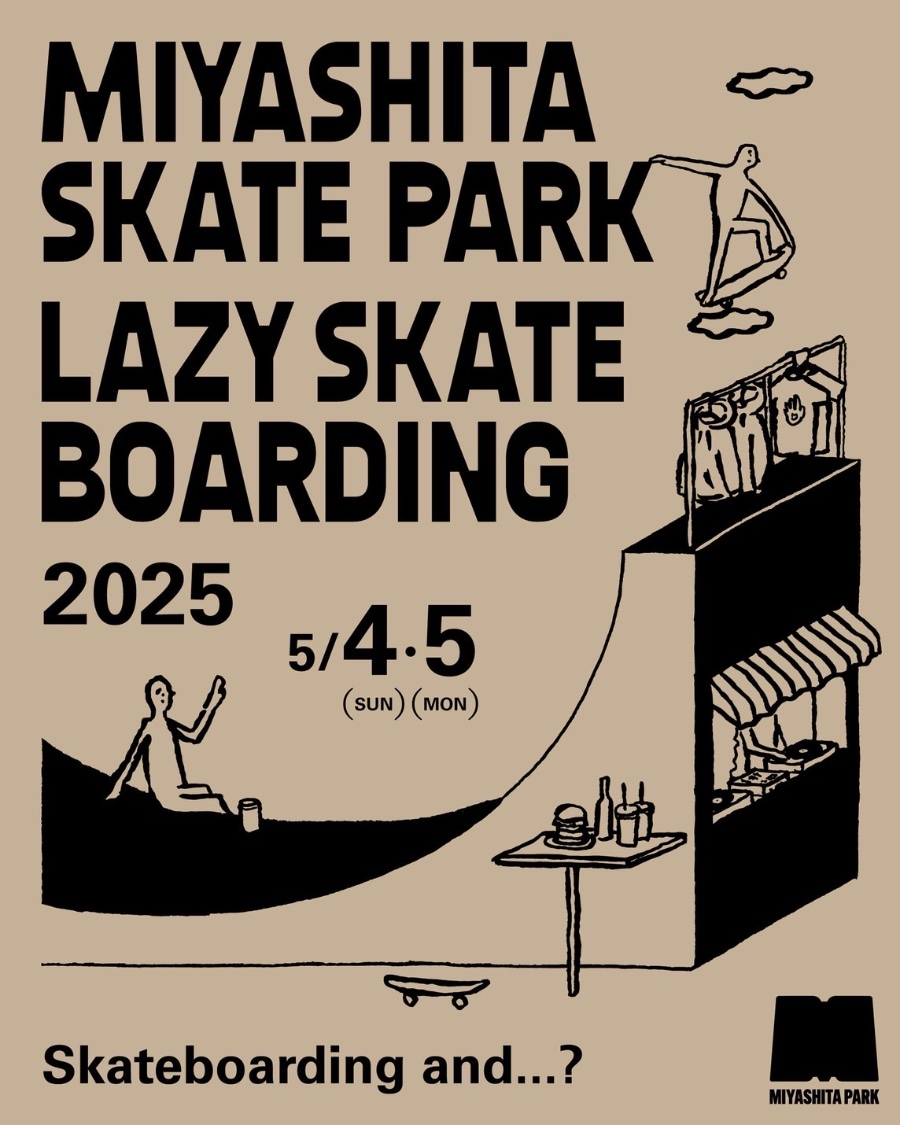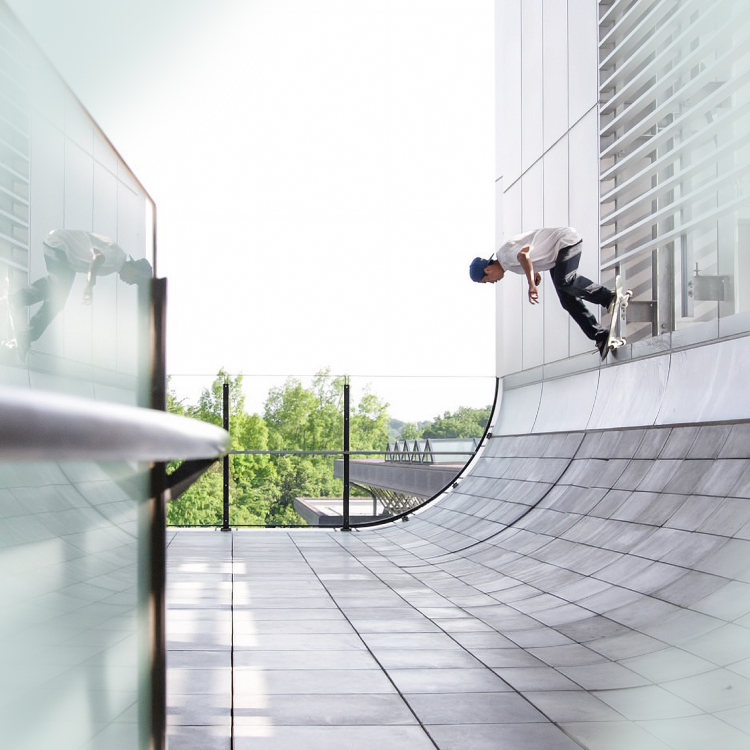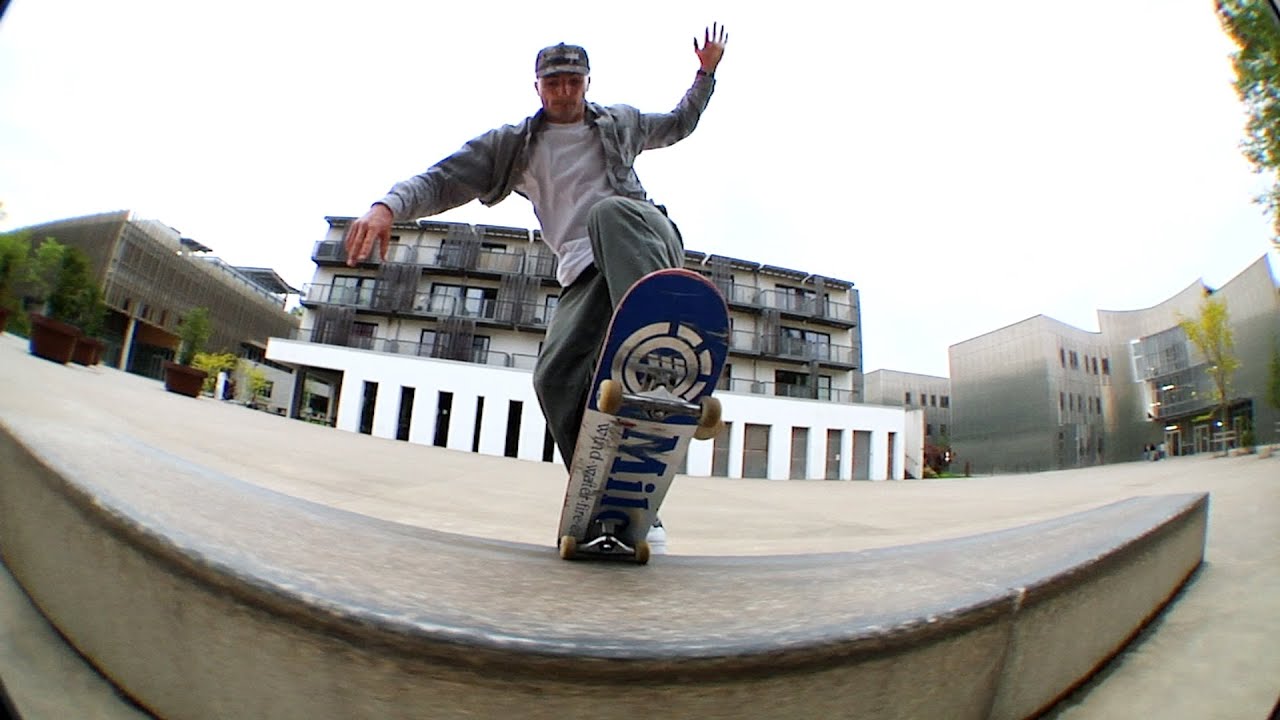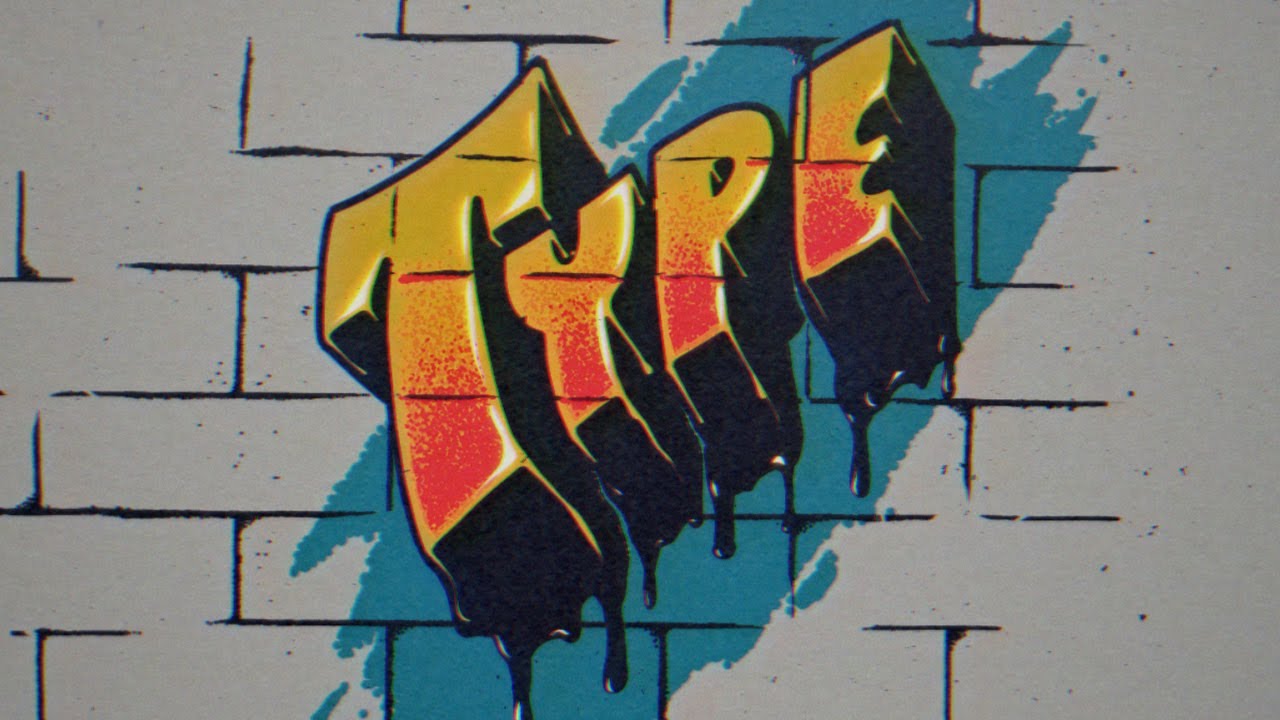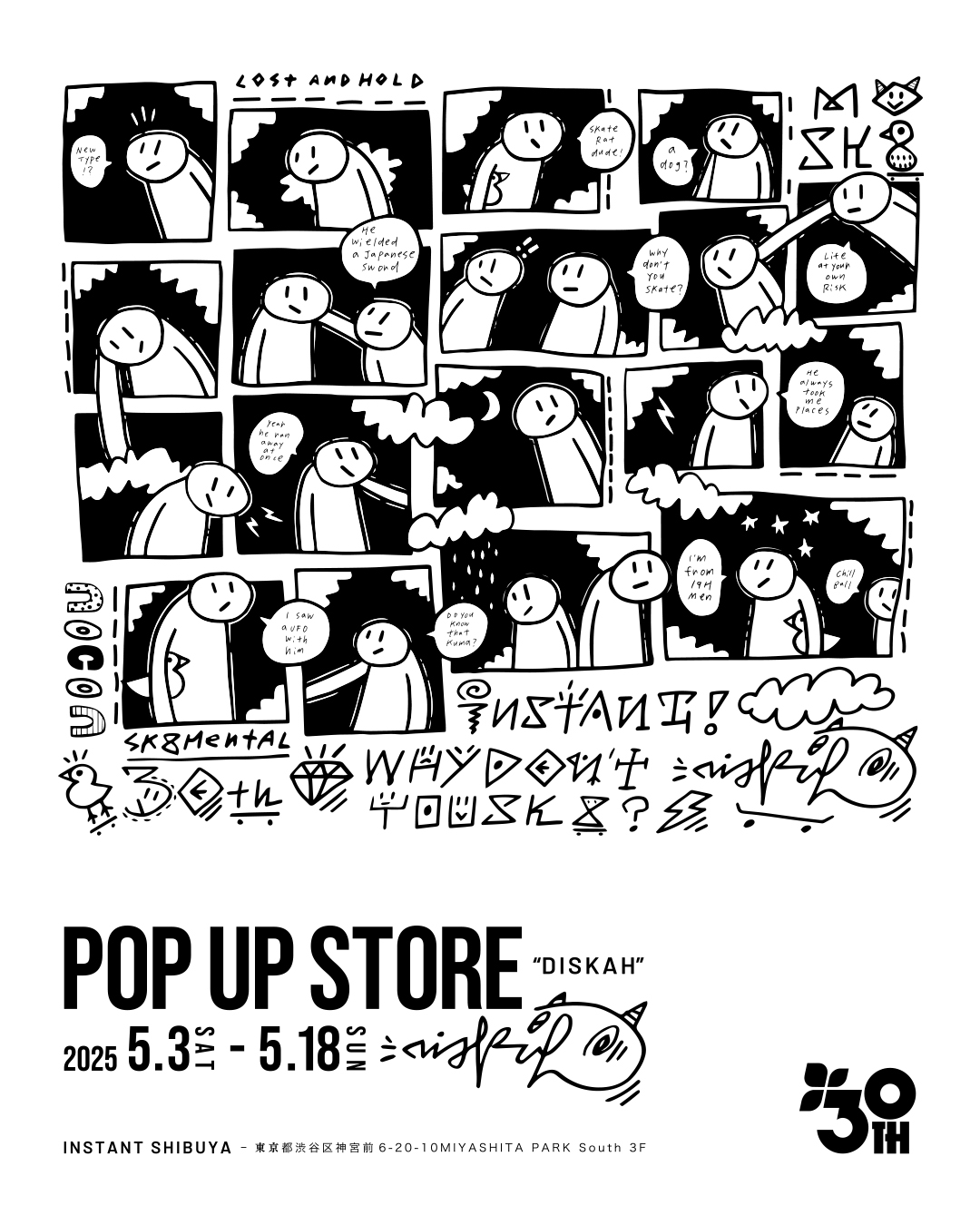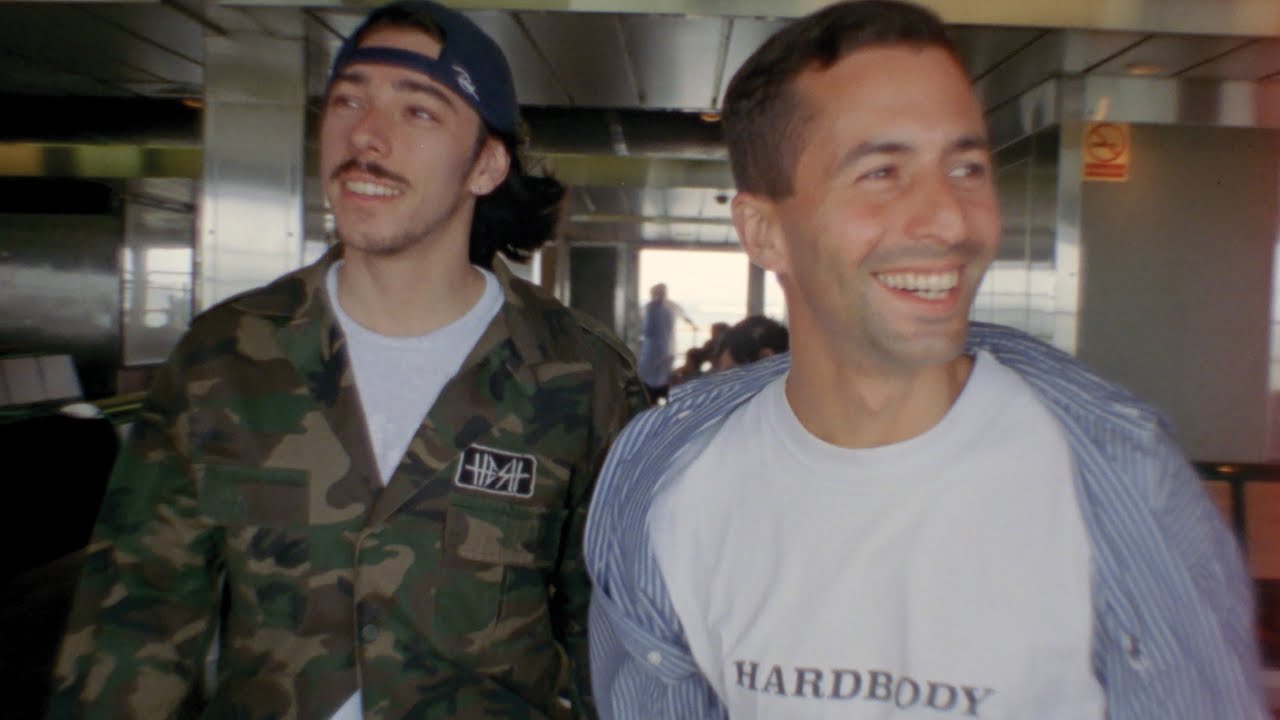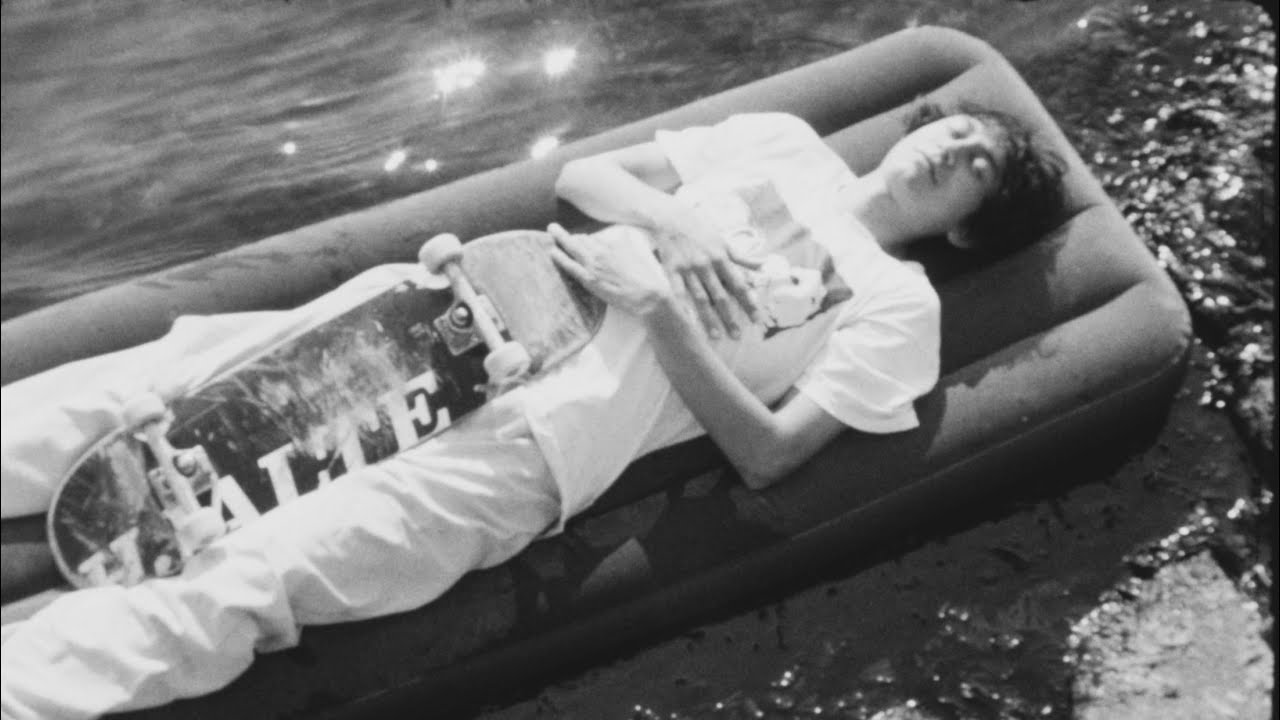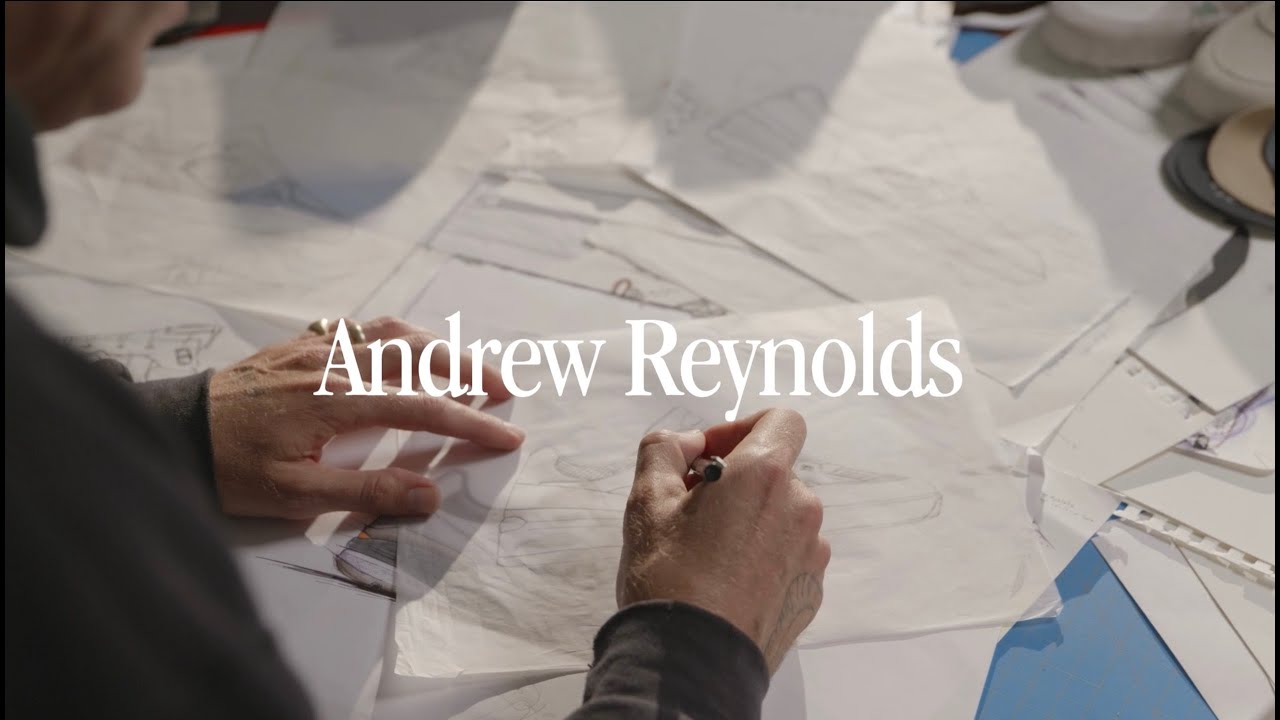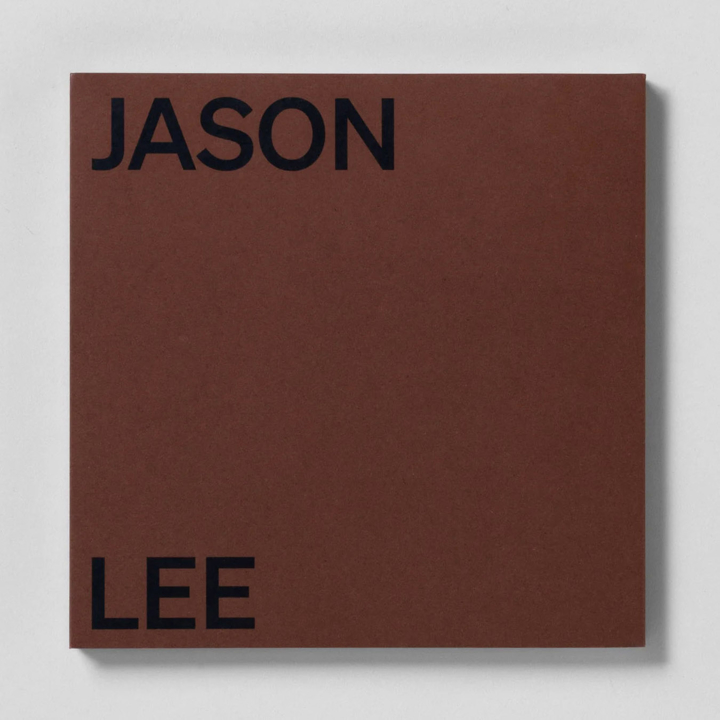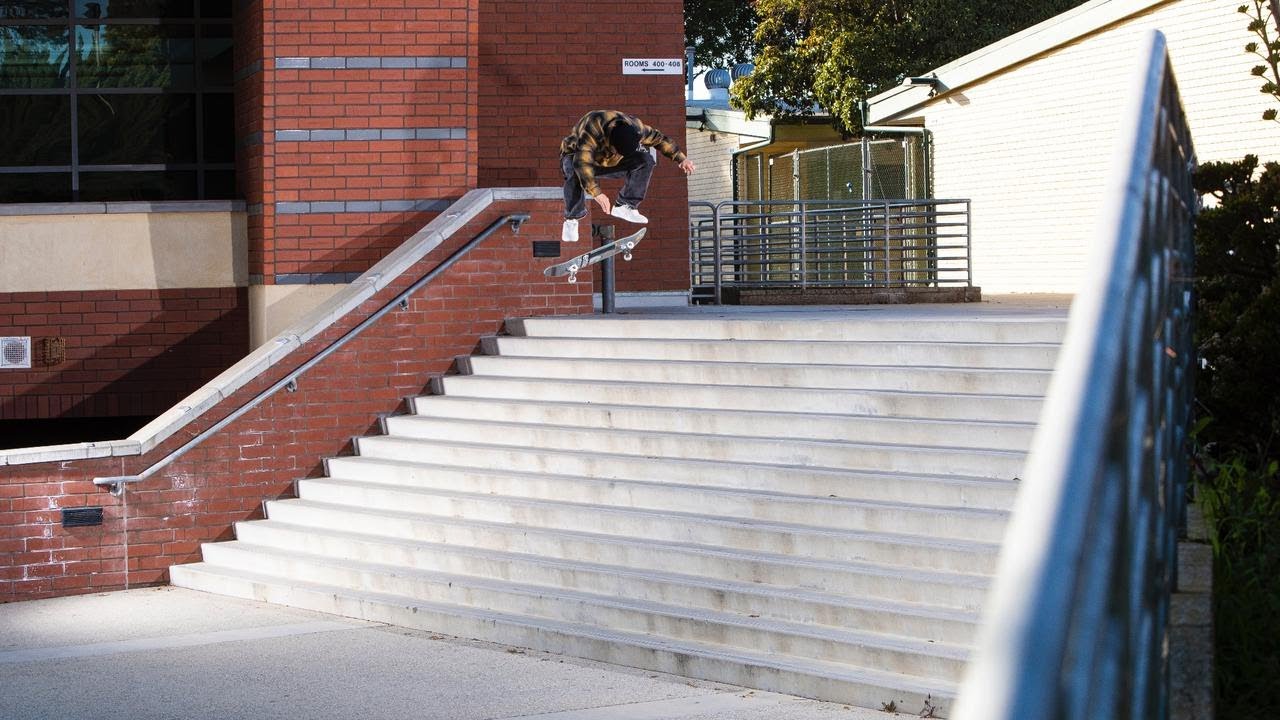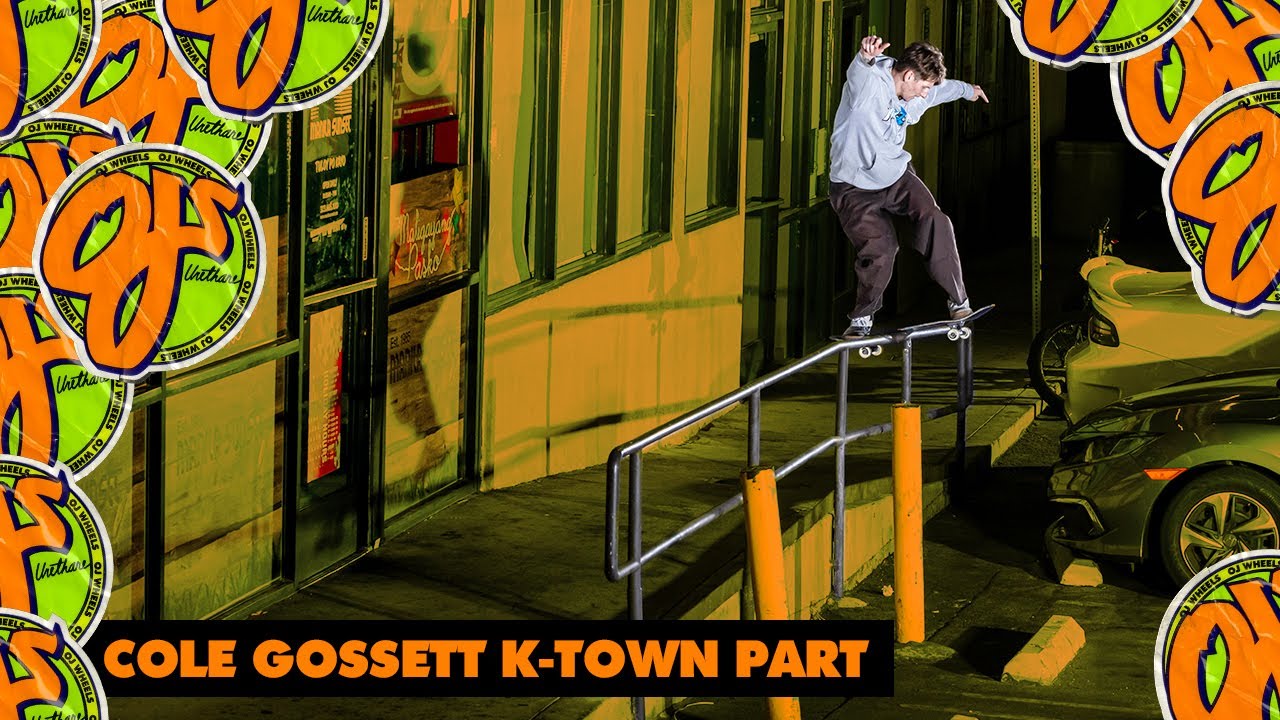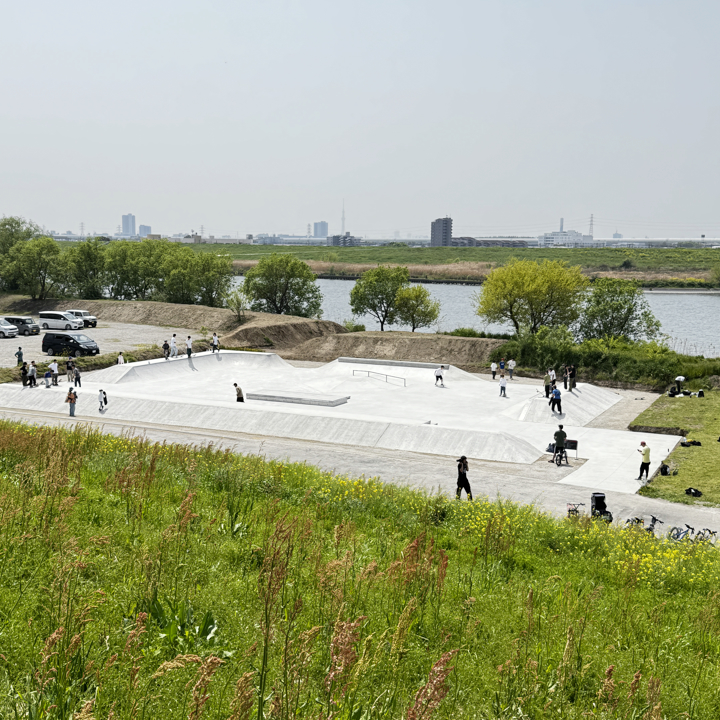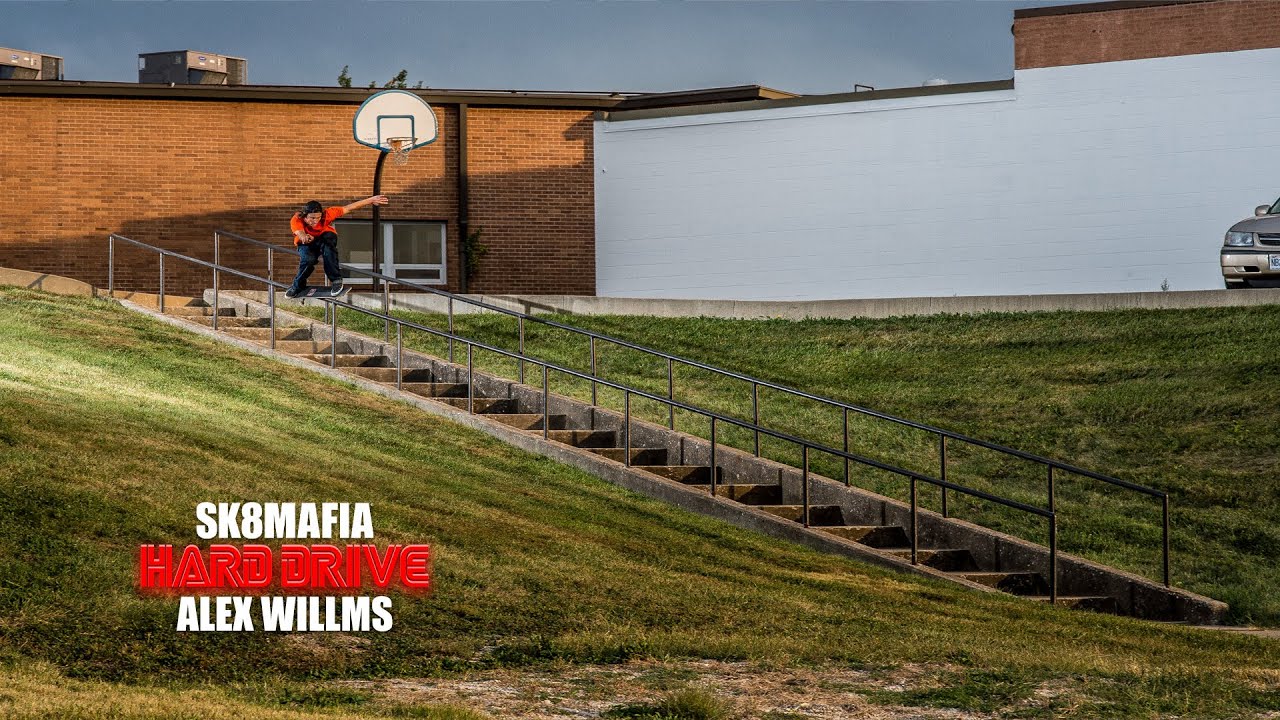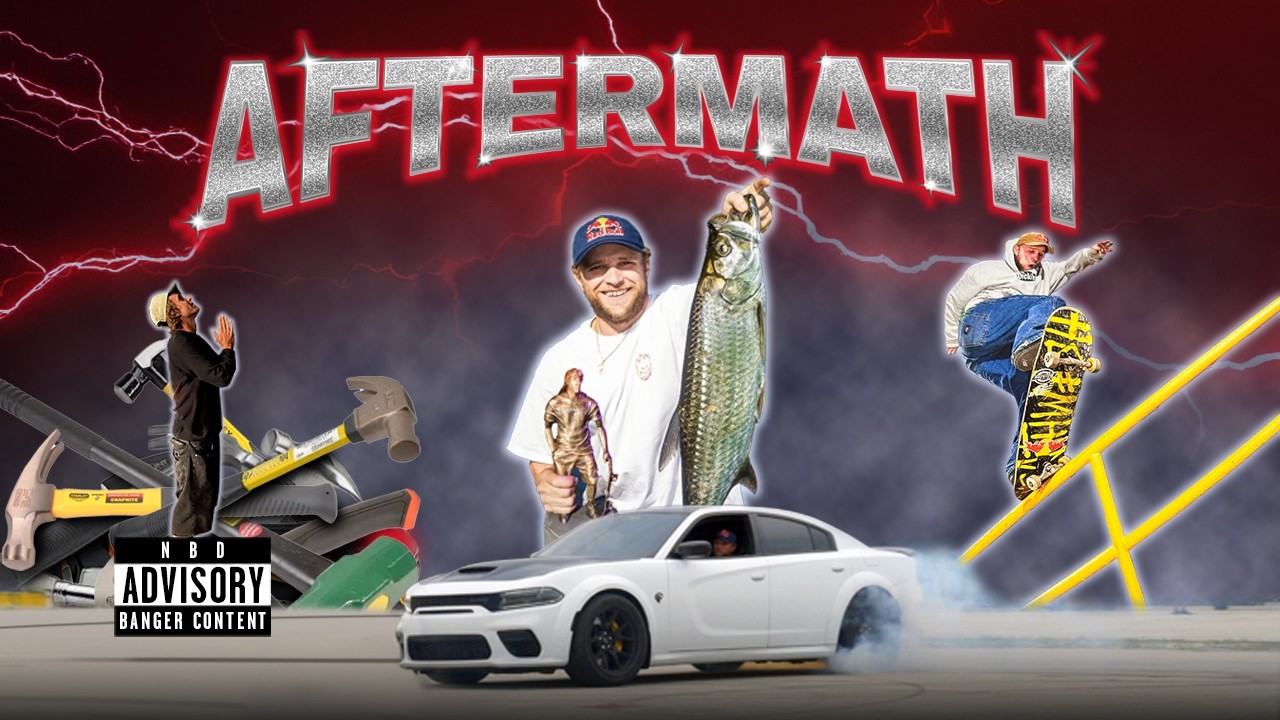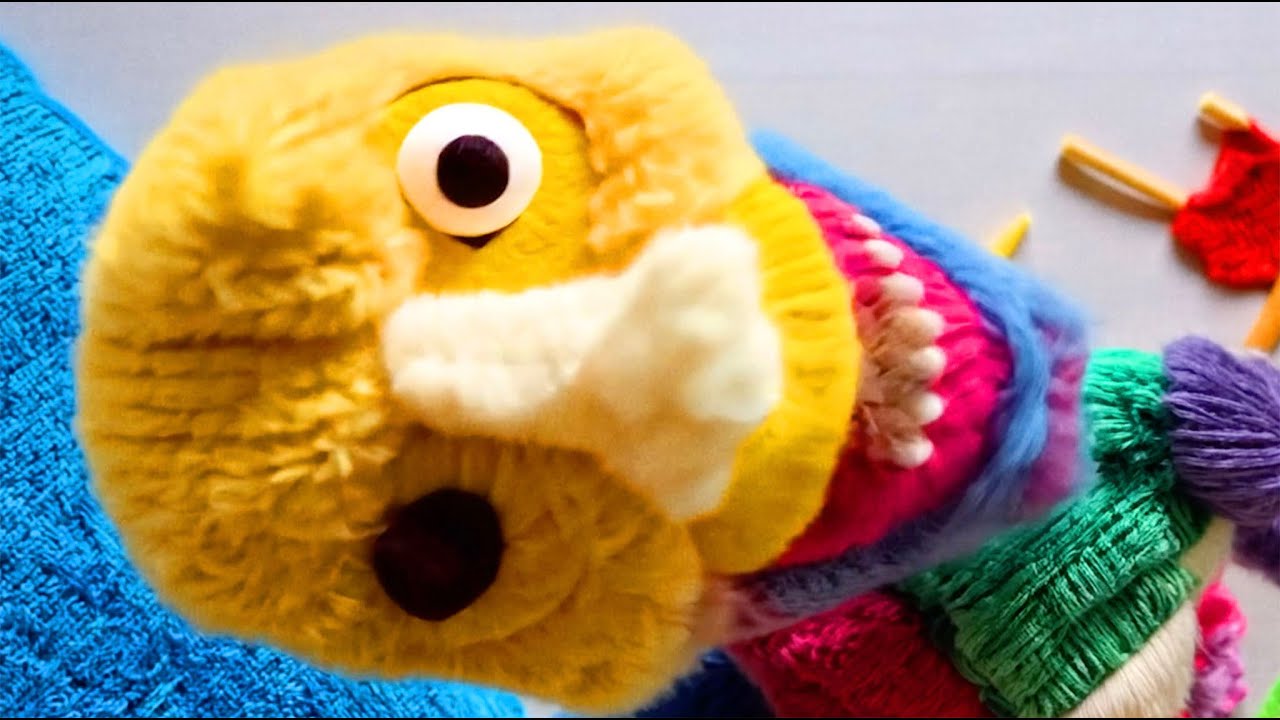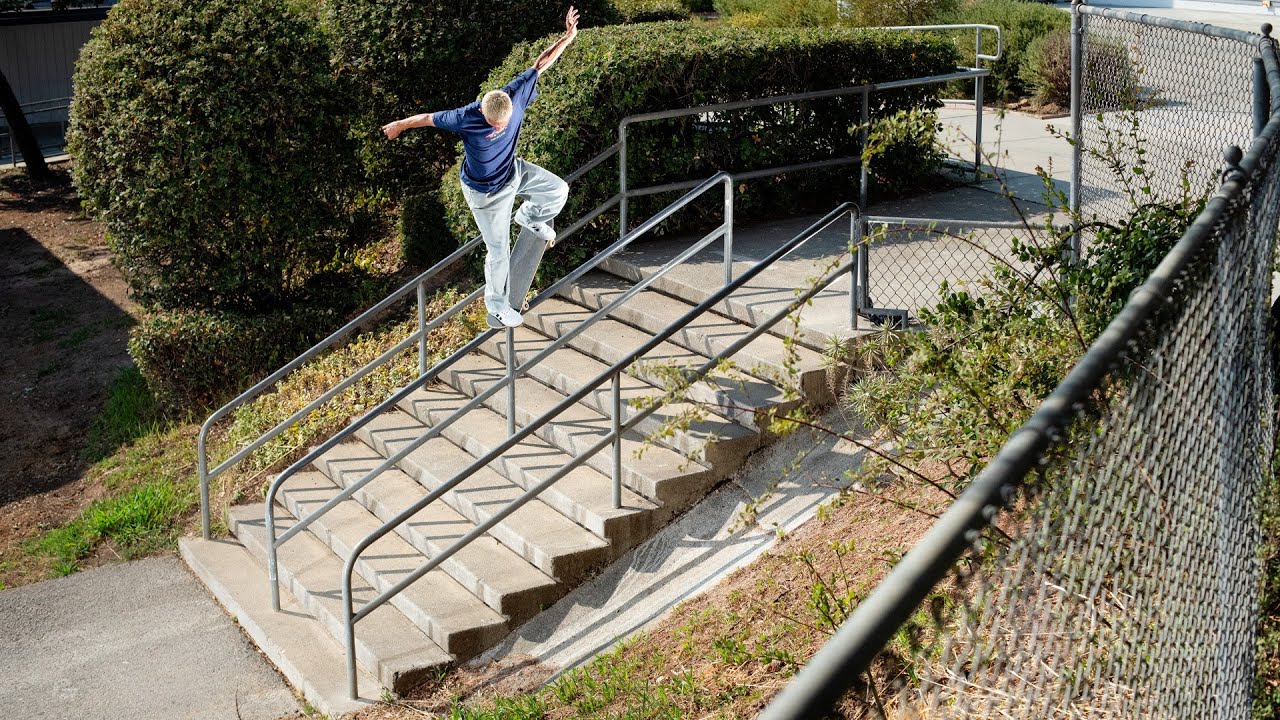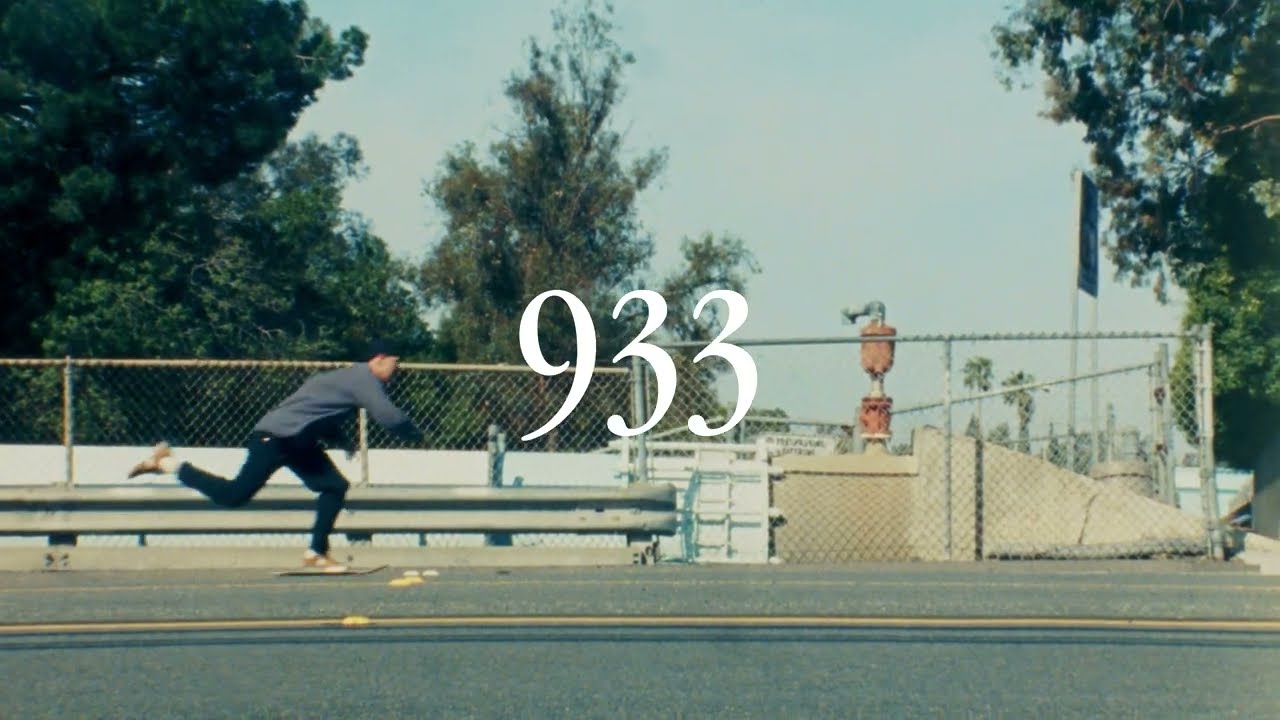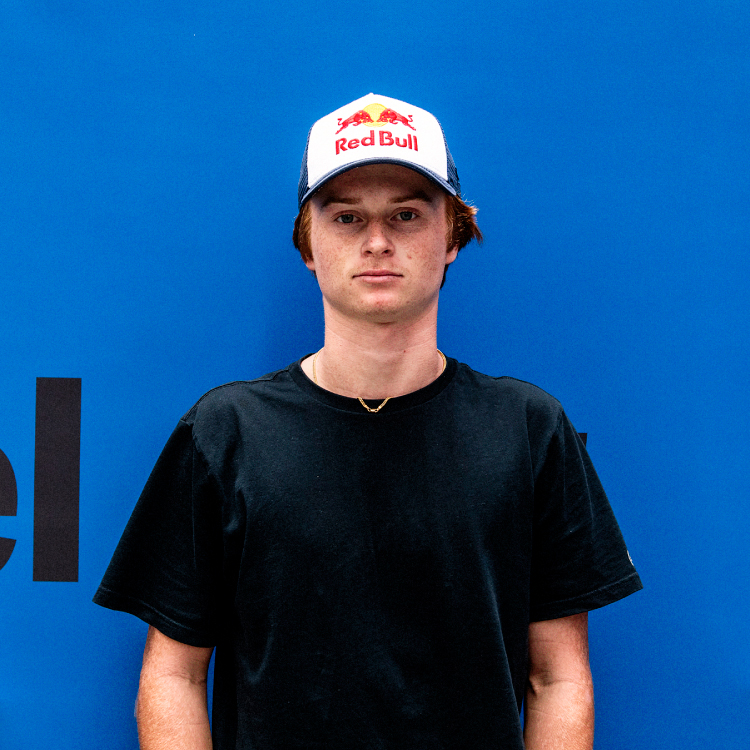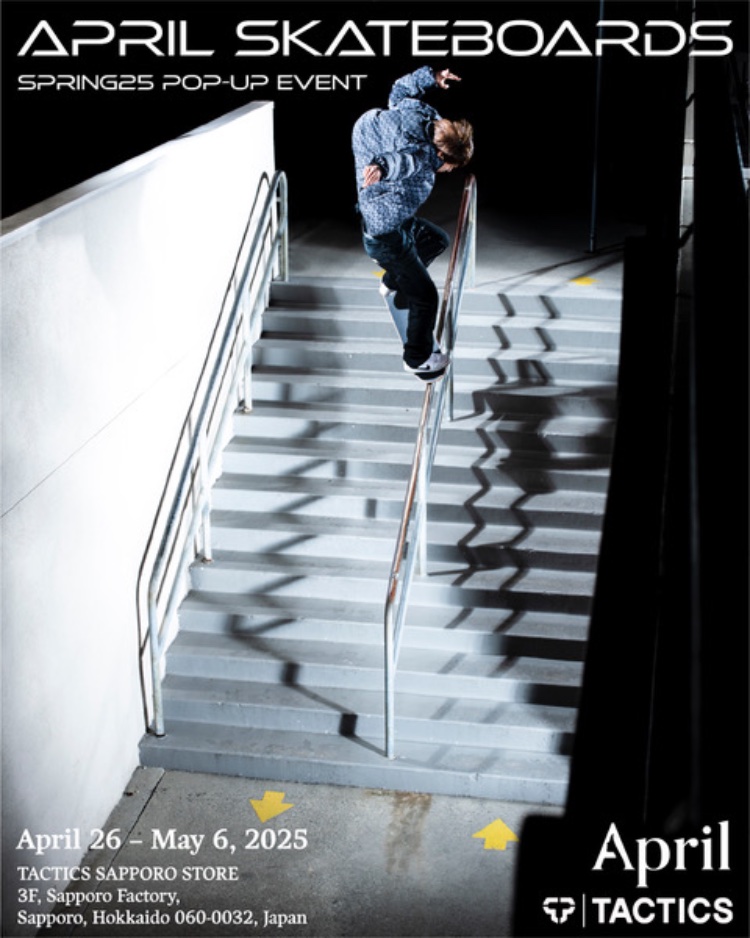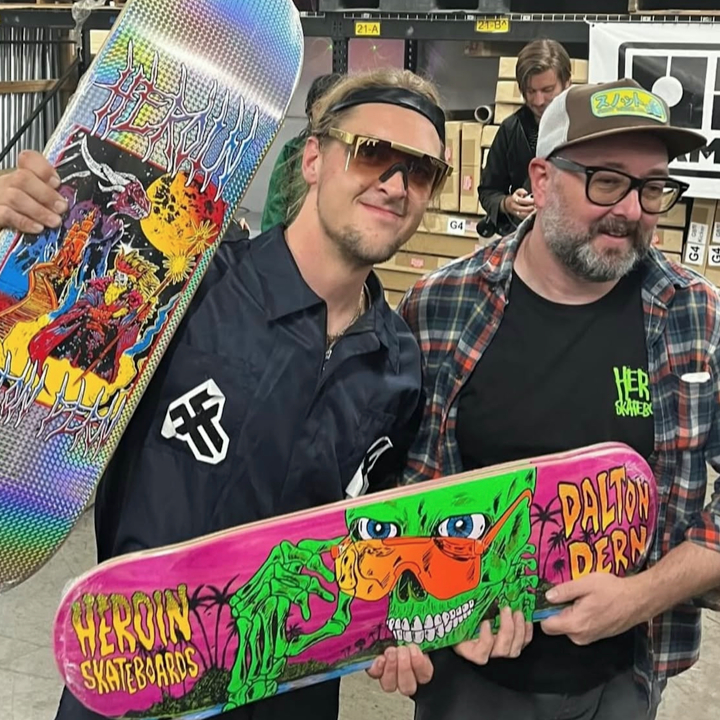Naoto is the first generation of street skaters in Osaka and is the frontman of RISE FROM THE DEAD. In commemoration of the release of his new album "LAYBACK", we trace his skating and music career.
──NAOTO (ENGLISH)
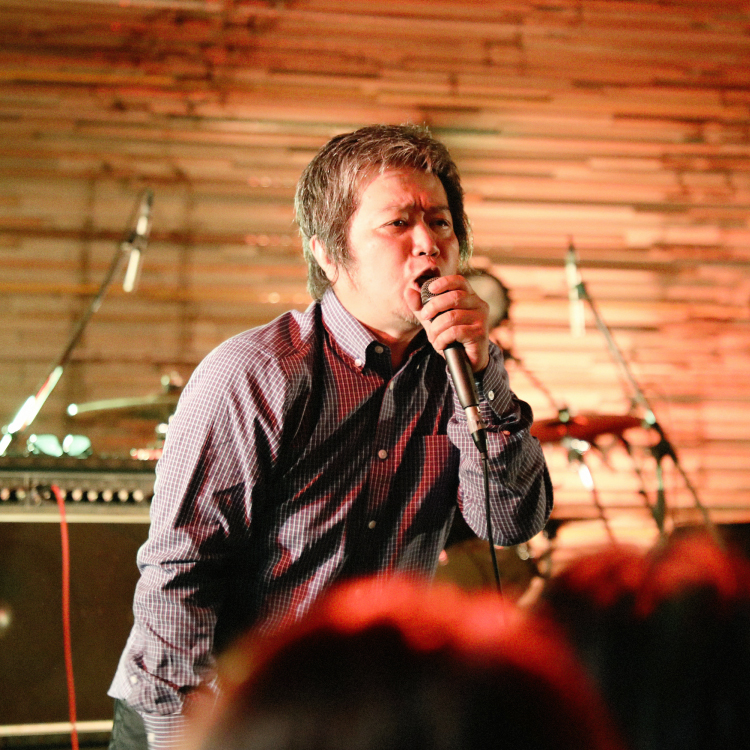
[ JAPANESE / ENGLISH ]
Photos_CARDKILL
VHSMAG (V): First of all, what was it like when you started skating in Osaka?
NAOTO (N): Originally, my uncle was a surfer and went to America and came back. He gave me one of those fiberglass penny boards as a souvenir. I was in middle school. So I rode it for a couple of months, skating down a hill. That was the beginning. Large trailers would drive by the hill, and my board shot into a nearby shipping company and the bearings fell apart. There were no skate shops back then, so I couldn't fix it, and that was the end of it. Then the skate boom came at the end of the '80s, and I started working in the Amemura when I was about 16.
V: Was that at Violent Grind?
N: No, at the DEPT STORE. I was at A STORE ROBOT before that, and that store was inside DEPT STORE at the time. When I started working at DEPT STORE, I had already started playing in a band called SxOxB, and when I looked at overseas bands, I saw that they were skating. You know, like Suicidal Tendencies. Then I got interested in it, and since it was in Amemura, there was Spotaka nearby. So I went to buy a skateboard right after I got paid at the DEPT STORE. I knew I wanted to buy Dogtown's Stonefish, not Powell Peralta, because I'm in a band and I like skulls. I guess that's when I really started getting into skating.
V: So SxOxB came first before skating?
N: In the '80s, SxOxB came first, but it was pretty much at the same time.
V: I've heard that you were skating at Triangle Park at that time.
N: Yeah, the DEPT STORE was located in the basement of SUNHALL, so I would go to the nearby Triangle Park during break time, but at first there was no one there. Triangle Park used to be a sandy area with swings. It was renovated and turned into a concrete park like how it is now. I bought a skateboard right around that time, so I started skating there. So there was no one there yet.
V: Then you're the first generation skater of the Triangle Park locals.
N: The very first. It was just me. I was skating by myself during breaks, and people were like, "What are you doing?" Skateboarding wasn't really something you would do in the streets back then. But then I found out there was street skating, and I was practicing boneless and ollies by myself at Triangle Park.
V: What other skaters were in Osaka at the time?
N: Kuririn (Isamu Sakai). Krillin was already there, but I hadn't met him yet when I was skating alone at Triangle Park. After work, I went to Spotaka to watch a skate video and met Kuririn and Agoro (Toshiyuki Noda) in front of the store. That's when the three of us started skating together. They would come to the DEPT STORE after school and skate at Triangle Park in the evening. Guys like Indo and Jagaimo known for potato roll would come by (laughs). That was pretty much it. Kuririn and Agoro would stay at the DEPT STORE until I finished work at 8pm or so, and then we would leave Triangle Park and go hit all the other spots. We did this every day.
V: I heard there's a funny story when you first met Kuririn in front of Spotaka.
N: I was wearing a Suicidal Tendencies hat I bought from Thrasher's mail order. Then Kuririn comes wearing a Suicidal Tendenies hat too. If you see something like that, you'd be like, "Who's this little kid? Who is this?" Then he hides his hat behind his back. I go, "What are you doing? Let me see it." And then I saw the words "Suicidal Tendencies" pasted with a cutting sheet. It was a handmade hat. That was funny (laughs).
V: It's an amazing era. Did your music career start with SxOxB?
N: No, I was with other bands before that. I guess SxOxB was the first one that got famous, or that it got off on the right track. I think we created a sound of a band that had never been heard before. We went overseas with SxOxB, and toured in Europe. So we were an influential band.
V: I have an image that Osaka at that time had a strong hardcore and reggae scene, but what was the music scene like in Osaka in the '80s and '90s?
N: There was a lot of hardcore and punk, but the reggae scene was going on more at night. They do it at clubs. It was like Krillin was a reggae DJ when we were in a band. Clubs have events every week, you know. Bands only have a few events a month. So I was going to clubs more often than bands. And it wasn't rock music, it was different kinds of music. So I was in a band at the time, but I didn't really hang out with the people in the scene. I was making music and playing live shows, but I didn't get along with those people at all, and all I did was hang out with skaters and club heads.
V: So it's like there was a kind of music crossover?
N: I guess so since I started going to clubs. I was listening to reggae, Hip-Hop, house, and techno at clubs. I like music regardless of genre, and maybe that's why there were so many unique bands back then. There were not so many places to gather back then. So the places to gather were limited. I don't think bands and clubs were so close back then, unlike now. I think there was a sense of distance.
V: What was SxOxB like when you joined?
N: The only original member was TOTTSUAN, the vocalist. I joined later, as did the guitarist. There were some old songs, but after that, we started to play new songs properly and became something completely different. There was the name SxOxB but we turned it into something completely different. I think what we started back then has become the sound of SxOxB today.
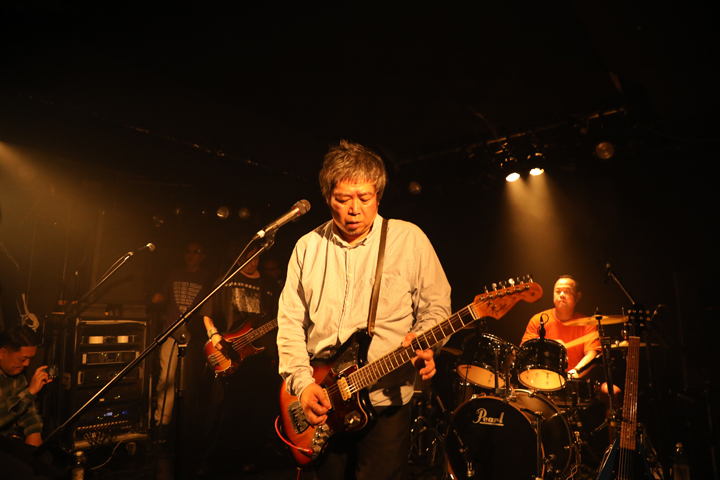
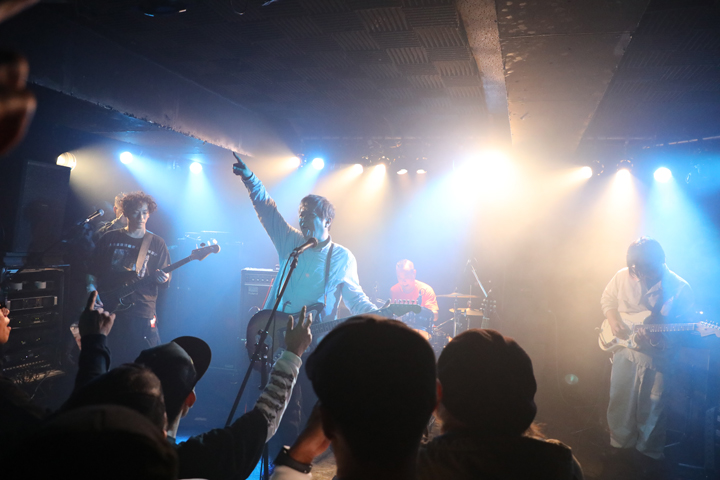
V: What made you leave SxOxB and start RISE FROM THE DEAD?
N: There was a British band called NAPALM DEATH, and we did a European tour together. We toured from England to Belgium, Holland, West Germany, and so on...it was the time of West Germany. We toured for about a month and did some recording. Then we came back to Japan and we were all tired.... Everyone was young at the time. The youngest was 19 and I was like 20. There was no manager, no interpreter, nothing. It was exhausting. Touring overseas is pretty sketchy. After the show, we had to carry all the equipment in the car to the place where we were staying because it could get stolen. We came home tired, and being young, I wanted to quit. So I took a break and started working on RISE FROM THE DEAD.
V: Did you feel that SxOxB and RISE FROM THE DEAD were musically different in your mind?
N: I was consciously trying to make it different. SxOxB is the originator of the fast hardcore, and I knew I couldn't do that. So I thought about lengthening the songs, slowing down the beat, and so on. I’d try to change the beat of each song so you get different tones in an album.
V: Back to skating again, you were working at Violent Grind in Osaka at the time, right?
N: I was working at DEPT STORE and skating at Triangle Park when the owner of a used record shop called KING KONG saw me and seemed to think well of me. A record shop in Tokyo called EDISON started Violent Grind, and KING KONG was approached through the record shop connection. I was offered to join, so I quit the DEPT STORE and moved to Violent Grind. That was around 1989, I think.
V: I hear a lot of rumors that Violent Grind was intimidating back then. Like if you didn't buy something, it was hard to walk out (laughs).
N: I think that's how it was (laughs). It wasn't like we were playing skate videos or anything like that. I’m sure it was intimidating (laughs). But we were doing something really core. There are many skate shops now, but there weren't that many back then.
V: Was there anything memorable that happened at Violent Grind?
N: We had a mini ramp in the shop. Kuririn and I made it in like two days. We bought plywood, a drill and a saw, and we built it in the shop. But next door was the owner's architectural office, and downstairs was a daycare center. Once we started skating, it was like, “Too loud! Stop!" We could only skate for like 10 minutes. That was it. We had copings and everything. So I made a jump ramp out of leftover wood and took it to Triangle Park for a demo with everyone. That’s how it was every day.
V: Also you've toured in Japan with Bad Brains, right?
N: They did it under the name Soul Brains because of rights issues or something. Well, but of course they're Bad Brains. We did four shows. We toured together and we'd do geneproduction. In short, we rehearse in the same setting as in a live show, with a set list and everything: you know, like where the MC and the lighting should be, how the sound should be balanced, etc. We'd practice for the live show in advance. We rented a big studio and had a rehearsal there, and when we finished, Bad Brains was going to have a rehearsal there as well. The tour starts the next day, so the Bad Brains crew will come and drop off all the equipment. And then the Bad Brains guys will come. It was like I finally met them. They were the first hardcore band in the world. I was stoked to see them. There's a bass player named Darryl, who always uses a green jazz bass, and I wanted to take a look at it. Then Darryl comes, and when he opened the case of the bass, there was nothing in it. I was like, "Wow," but he definitely knew what he was doing. He didn't bring it on purpose. Then he had the promoter buy a new Fender bass the next day. The dude was bad. He would have known if he didn't have the bass in the case. On the day of the show, after we finished and when it was time for the Bad Brains to go on stage, bass player Darryl wasn't there. We all looked for him and found him passed out in the bathroom. We were like, "Oh my God, this is insane,” and woke him up. That dude is really badass.I really badass (laughs).
V: That's insane (laughs).
N: And that's the first day of the tour. They're legendary. They were all over 40. After the first day was over, they'd head over to a hotel. The next day we had to travel, so our crew stayed at the same hotel as the Bad Brains. I lived in the neighborhood, so I went home. So I went to the hotel at dawn and found H.R. standing in front of the escalator way before the check-out time. And he's holding a gold attache case and a gold crown made of paper. He kept saying "Good morning, good morning" to total strangers who were coming down the escalator. I was like, "This guy's insane, H.R.'s crazy!" I looked at him and saw that he was wearing a white windbreaker setup, but the top and bottom were both inside out. I wondered if it meant anything, but from there I went to Shin-Osaka station. When he sees a bullet train for the first time, he's tripping. So we all get on the bullet train together, and H.R. is quite the weirdo, so we leave about three seats open and stay away from him. He was the only one sitting in the front row, and he had a gold attache case with a gold ballpoint pen, a cassette tape, and a bottle in it. The bottle was perfume, and he started spraying it all over the bullet train. I was like, “Crazy. This guy is dangerous." The next day we played a show in Nagoya, and for the next three days he played nothing but reggae, almost no hardcore. The crowd didn't like it (laughs).
V: That's straight up crazy (laughs).
N: I knew that H.R. greeted people in the hotel lobby every morning, so I waited for him and asked him to sign a T-shirt, and he wrote "Jah Love H.R." on it, but it was super small (laughs). He wrote me a super small autograph, and I gave H.R. some popcorn as a joke. Incidentally, the purpose of Bad Brains' visit to Japan was to make a tribute album. We Japanese bands recorded various songs, and at the end, there's a new song by the Bad Brains, titled "One Like Popcorn." That's a song about the popcorn I gave him (laughs).
V: That's funny (laughs). Tell us about the new RISE FROM THE DEAD 7-inch EP "LAYBACK" that you just released. The title is the name of a skate trick, and it includes a song called "710boyz," which is about a skate crew led by Kenji Kumeda. It has a strong skate flavor. How did the release come about?
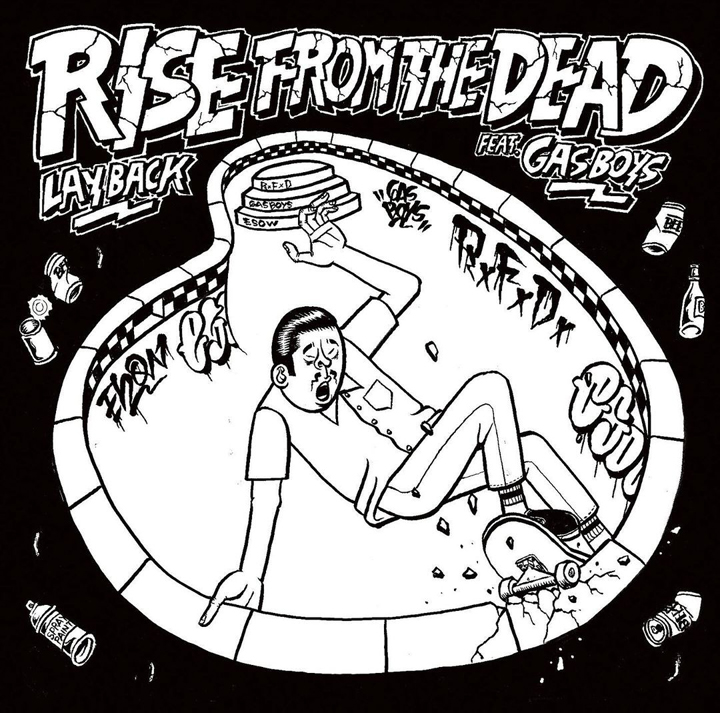
zeromagazine.base.shop/items/81807294
N: At my age, I want to take it easy. So it's called layback. To explain how it happened, we had a live show in the fall of the year before last, and we decided to do the show while still arguing with the members of the band. As for myself, I was thinking of retiring since I was already 55. Since this was my last live event, I asked GASBOYS, with whom I had collaborated, to appear, and I thought it was a good way to bring closure to my career. So I said hello to Uesugi of GASBOYS after the new year. He immediately responded, "Would you like to play one more song?” I was like, "For real?” That’s how I decided to work on new songs. GASBOYS and I were both active around the same time, and skating was involved as well. Since we are from the same culture, we decided to create a street-style sound. The A-side has a strong skate feel with "Layback" and "710boyz," but the B-side, "Surpass," is a trip-hop kind of song, which is different. That's a song about me riding my pist bike, and the GASBOYS running. I'm on the Yodo River riding a bike and they're on the Arakawa River running. As for skating, I can't skate like I used to, but it's something I can't live without. That's how I met Kenji in the first place.
V: The jacket is by JESSE (ESOW), right?
N: Yeah. I discussed it with ZERO MAGAZINE, the label for this project, and they said, "Why not JESSE?” I was like, “That would be rad." I really like the artwork, and the thing that made me happiest was the thumb. I love the way he drew the thumb. That's the part where skaters look at, you know? JESSE is the man.
V: You’ve worked with GASBOYS for a song called "Come On Sky" about 20 years ago. Is this the first time since then that you have written a song together?
N: Yeah. GASBOYS are professionals. We call ourselves "professional hardcore," but GASBOYS is also professional. It doesn't matter if you're major, indie, or minor, they're professional. There are professionals in every genre, even if they don't make a living at it.
V: You said in an old interview that you didn't really like the term "hardcore."
N: I didn't like it much. That's why I say "professional hardcore" on purpose, as if it were a joke. Hardcore means mastering something, right? If you master anything, it's hardcore. Even a ramen shop is hardcore if you master it (laughs). That's why I call myself a professional. I don't really like the term hardcore or punk or whatever. So when people ask me what I do, I say "I'm a professional hardcore." It sounds stupid, doesn't it? It fits better than saying, "I'm hardcore!"
V: What's your thoughts on the 710boyz?
N: A professional punk skater. If pool skating is the beginning of skateboarding, I think that's the root of skating. The spot called Brazil isn't exactly a pool, but there are days when you sneak in and can only skate for 10 minutes. They're doing that every morning. They clean up trash left by non-skaters every day. They’re always keeping the place for their own enjoyment. I think that's great. No one else does that. I really respect them. I think it is a sacred place. I really hope it will always be there and never disappear. That's why I wrote the song 710boyz. The lyrics are a conversation at the Brazil spot. The word "God's Tree” is something that's there. So is the line “Surpass yourself!” It’s about something that happens at the spot.
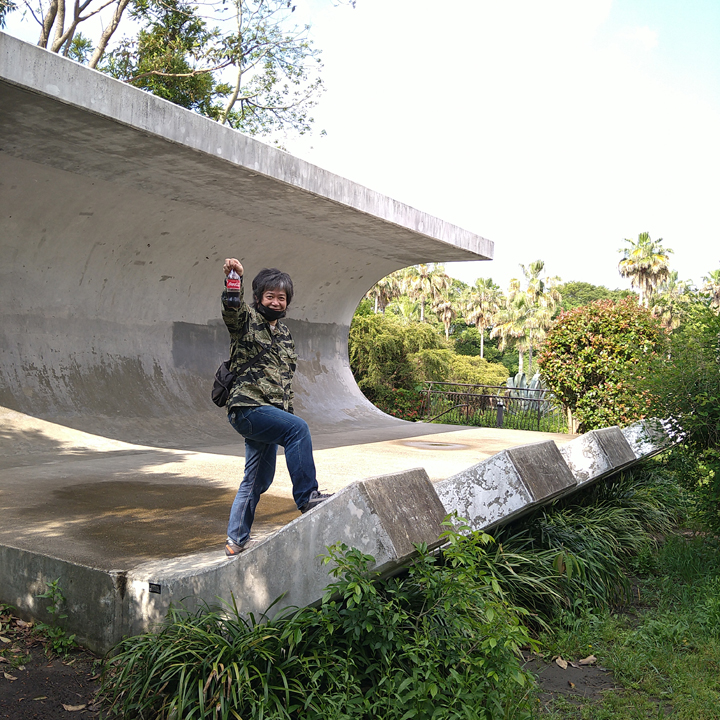
V: What are your plans in the near future? What's coming?
N: On April 7, GASBOYS and I are going to have a release celebration live at CONPASS in Shinsaibashi, Osaka. After that, I thought about quitting my music career, but I decided to continue it a little longer. I've already finished recording, and I think GASBOYS' songs and the ones that will come out after that will be good, so heads up.
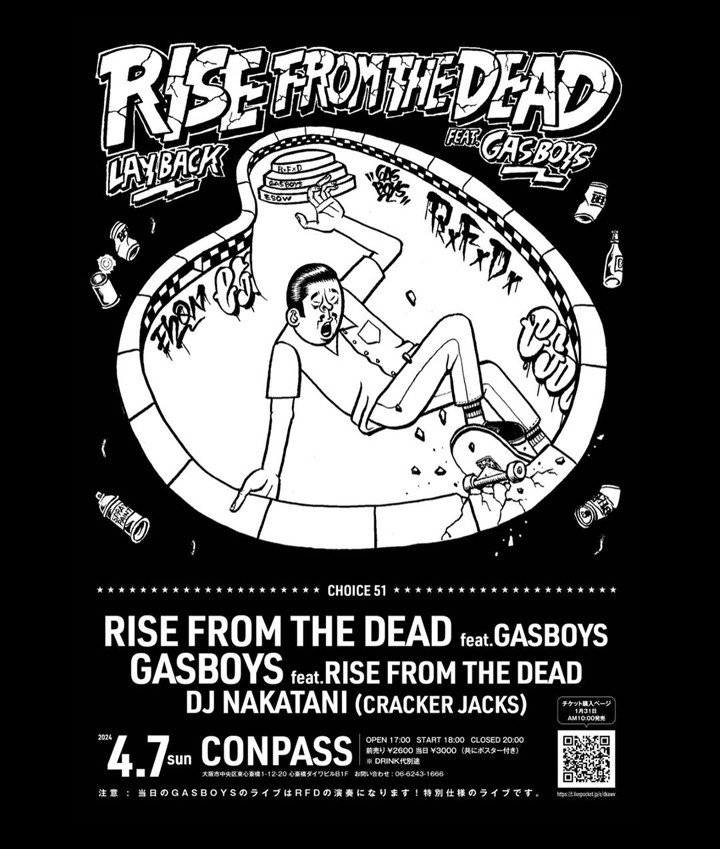
t.livepocket.jp/e/dkawv
NAOTO
@naopon7010
Born in Osaka, Japan. As a member of SxOxB in the 80's, he established a steadfast position in the hardcore scene and formed RISE FROM THE DEAD. He is also known as one of the first generation of street skaters in Osaka, and is currently active as a member of 710boyz.








